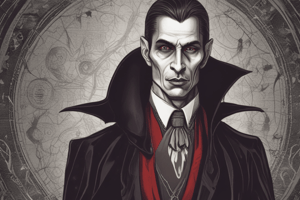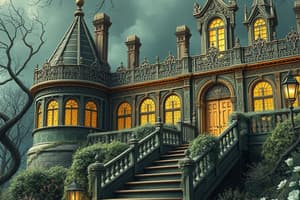Podcast
Questions and Answers
Explain the origins of the term 'Gothic' in the context of Gothic novels.
Explain the origins of the term 'Gothic' in the context of Gothic novels.
The term 'Gothic' initially referred to a Medieval style of architecture in the 12th century and was later used in literature by English writer Horace Walpole in 1764 in his work 'The Castle of Otranto.'
What are the defining characteristics of Gothic literature?
What are the defining characteristics of Gothic literature?
Gothic literature features terror, gruesome narratives, supernatural elements, and dark, picturesque scenery, often set in gloomy, isolated castles.
How does Gothic literature relate to the larger Romanticism movement?
How does Gothic literature relate to the larger Romanticism movement?
Gothic literature is part of Dark Romanticism, emerging in the late 1700s as a literary genre within the larger Romanticism movement.
What are some elements that evoke mystery and fear in Gothic stories?
What are some elements that evoke mystery and fear in Gothic stories?
Who was the English writer known for using the term 'Gothic' in literature, and in which work did he first use it?
Who was the English writer known for using the term 'Gothic' in literature, and in which work did he first use it?
Which architectural style initially inspired the term 'Gothic' as used in Gothic novels?
Which architectural style initially inspired the term 'Gothic' as used in Gothic novels?
Who was the English writer credited with first using the term 'Gothic' in literature, and in which work did he first use it?
Who was the English writer credited with first using the term 'Gothic' in literature, and in which work did he first use it?
What is a defining characteristic of Gothic literature within the larger Romanticism movement?
What is a defining characteristic of Gothic literature within the larger Romanticism movement?
In what setting are Gothic novels often placed?
In what setting are Gothic novels often placed?
What are some common elements used to evoke mystery and fear in Gothic stories?
What are some common elements used to evoke mystery and fear in Gothic stories?
Flashcards are hidden until you start studying
Study Notes
Origins of the Term 'Gothic'
- The term 'Gothic' originated from the architectural style of the same name, characterized by grandeur, ornateness, and a sense of mystery and horror.
- The term was later adopted in literature to describe a genre of fiction that evoked similar feelings of fear, mystery, and awe.
Defining Characteristics of Gothic Literature
- Emphasis on emotion, imagination, and the subconscious
- Exploration of the darker aspects of human nature and the supernatural
- Use of suspense, mystery, and horror to create a sense of fear and unease
- Often features atmospheric, old, and decaying settings
- Typically involves a sense of the unknown or unexplained
Relation to Romanticism
- Gothic literature emerged as a subset of the larger Romanticism movement
- Shared focus on emotion, imagination, and the individual's experience
- However, Gothic literature tends to emphasize the darker and more irrational aspects of human nature
Elements of Mystery and Fear
- Use of atmospheric setting, such as old castles, abandoned monasteries, and mysterious landscapes
- Incorporation of supernatural elements, like ghosts, demons, and mysterious creatures
- Emphasis on the unknown or unexplained, leaving the reader's imagination to fill in the gaps
- Use of suspense and foreshadowing to create a sense of anticipation and fear
Key Figures and Works
- Horace Walpole, an English writer, is credited with first using the term 'Gothic' in literature in his novel "The Castle of Otranto" (1764)
- Walpole's work is considered a foundational text of the Gothic genre and helped establish its defining characteristics
Settings and Atmosphere
- Gothic novels are often set in old, atmospheric locations, such as castles, monasteries, and abandoned churches
- These settings are often used to create a sense of foreboding, mystery, and fear
Studying That Suits You
Use AI to generate personalized quizzes and flashcards to suit your learning preferences.




